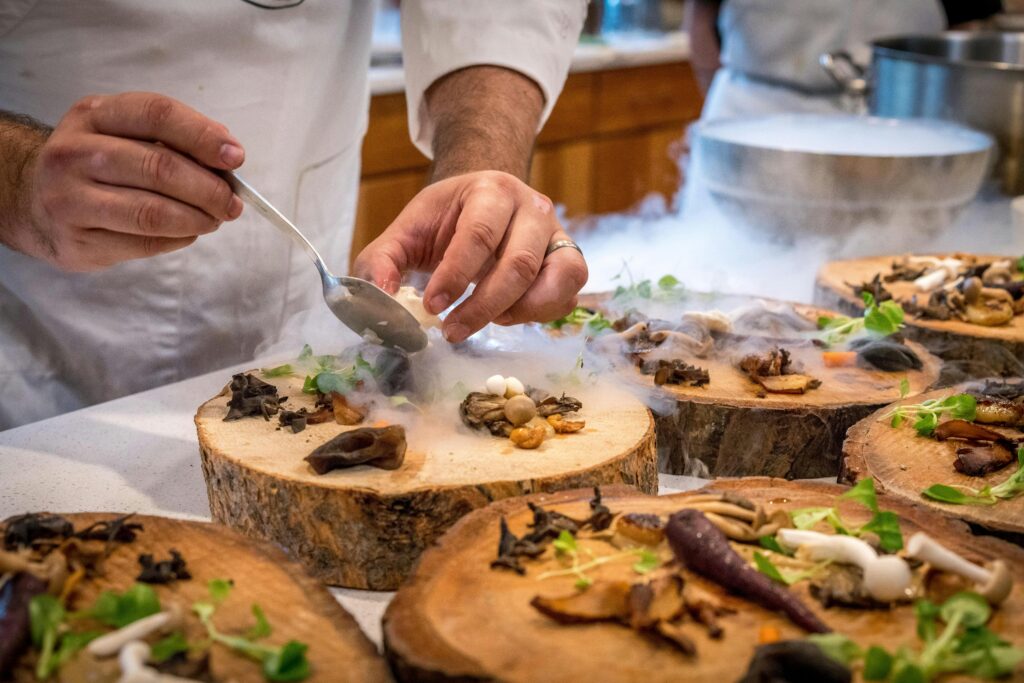Masters in Culinary Arts – If you’re passionate about cooking, baking, or food science and dream of perfecting the art of culinary creations, then a Master’s in Culinary Arts in the UK could be the best option to make a career in it.
This course focuses on the art of cooking along with food science, nutrition, and the intricacies of food safety and hygiene.
The UK, known for its rich culinary history and world-class universities, is a great platform for international students to take their first step of their career in the culinary industry.
This blog will discuss the requirements, benefits and universities for your master’s in Culinary arts in the UK.
Why Choose the UK for a Masters in Culinary Arts?
The UK offers numerous advantages for students aspiring to master culinary arts. Here are some compelling reasons:
- World-Class Education: Some of the world’s top universities are located in the UK and offer cutting-edge programs that expose students to innovative cooking techniques and the latest in food science.
- Diverse Career Opportunities: The UK’s booming culinary sector offers a wide range of career paths, from restaurants and hospitality to food production and research.
- Cultural Diversity: Studying in the UK means getting to experience a vibrant, multicultural environment, which can fuel creativity and new ideas.
- Innovation and Sustainability: Many culinary programs in the UK focus more on sustainability and forward-thinking food practices, which are in line with the global shift toward more ethical and responsible food choices.
Top Universities Offering Master’s in Culinary Arts
Several universities across the UK offer Master’s programs in Culinary Arts. These programs combine practical culinary training with in-depth studies in food science, innovation, and sustainability.
Below is a list of some leading institutions, along with their average tuition fees for master’s degree:
Core Specializations in Culinary Arts
A Masters in Culinary Arts in the UK offers a broad range of specialisations, allowing you to focus on various aspects of the culinary industry.
Some of the core specialisations include:
- Culinary Arts Management: This specialisation focuses on managing kitchens, leading culinary teams, and overseeing food production. It’s ideal for you, if you want to step into leadership roles within the hospitality industry.
- Food Systems: In this specialisation, you will learn about global food systems, sustainable practices, and the role of culinary professionals in promoting healthy, ethical food choices.
- Food Science and Innovation: This area focuses on the scientific principles behind food preparation and innovation in food products.
- Culinary Innovation and Food Product Development: If you are someone who wishes to create new food products and culinary techniques, then this is the right place for you
- Food Safety and Hygiene: In this specialisation, you will learn to ensure safe food handling, from production-to-plate.
These specialisations ensure you have the skills and knowledge to succeed in various culinary careers, from high-end restaurants to food product development labs.
Cost of a degree in Culinary Arts in the UK
Tuition fees for a Master’s in Culinary Arts vary depending on the university, location, specialisation, etc. The average annual tuition fee for international students is between £12,000 and £15,000.
In addition to tuition, students should budget for living expenses, including accommodation, food, transportation, and personal expenses.
Living in larger cities such as London can be more expensive than in smaller cities like Coventry or Leeds, so it’s advisable to consider location when budgeting for their studies.
Admission Requirements and Eligibility
To apply for a Masters in Culinary Arts in the UK, you must meet the following general eligibility criteria:
- Academic Qualifications: Most universities require a Bachelor’s degree with a minimum of 65% aggregate, or equivalent, in a related field
- English Proficiency: As an international student, you will need to demonstrate proficiency in English. An IELTS score of 6.0 (with no band less than 5.5) is typically required.
- Work Experience: Some programs prefer or require applicants to have prior experience in the culinary field, although this may not be mandatory for all universities.
- Letters of Recommendation: You may need to submit two or three letters of recommendation from academic or professional sources.
- Personal Statement: A statement of purpose (SOP) outlining your passion for culinary arts and your career aspirations.
Each university may have additional or specific requirements, so it’s essential to check the entry criteria for your chosen program.
